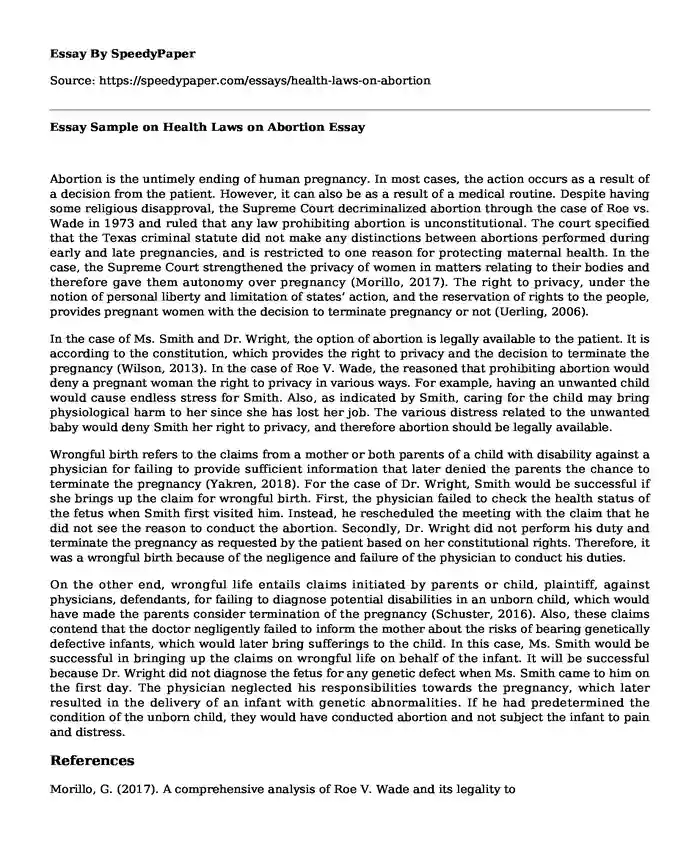
| Essay type: | Persuasive essays |
| Categories: | Law Court system Abortion Social issue |
| Pages: | 3 |
| Wordcount: | 698 words |
Abortion is the untimely ending of human pregnancy. In most cases, the action occurs as a result of a decision from the patient. However, it can also be as a result of a medical routine. Despite having some religious disapproval, the Supreme Court decriminalized abortion through the case of Roe vs. Wade in 1973 and ruled that any law prohibiting abortion is unconstitutional. The court specified that the Texas criminal statute did not make any distinctions between abortions performed during early and late pregnancies, and is restricted to one reason for protecting maternal health. In the case, the Supreme Court strengthened the privacy of women in matters relating to their bodies and therefore gave them autonomy over pregnancy (Morillo, 2017). The right to privacy, under the notion of personal liberty and limitation of states’ action, and the reservation of rights to the people, provides pregnant women with the decision to terminate pregnancy or not (Uerling, 2006).
In the case of Ms. Smith and Dr. Wright, the option of abortion is legally available to the patient. It is according to the constitution, which provides the right to privacy and the decision to terminate the pregnancy (Wilson, 2013). In the case of Roe V. Wade, the reasoned that prohibiting abortion would deny a pregnant woman the right to privacy in various ways. For example, having an unwanted child would cause endless stress for Smith. Also, as indicated by Smith, caring for the child may bring physiological harm to her since she has lost her job. The various distress related to the unwanted baby would deny Smith her right to privacy, and therefore abortion should be legally available.
Wrongful birth refers to the claims from a mother or both parents of a child with disability against a physician for failing to provide sufficient information that later denied the parents the chance to terminate the pregnancy (Yakren, 2018). For the case of Dr. Wright, Smith would be successful if she brings up the claim for wrongful birth. First, the physician failed to check the health status of the fetus when Smith first visited him. Instead, he rescheduled the meeting with the claim that he did not see the reason to conduct the abortion. Secondly, Dr. Wright did not perform his duty and terminate the pregnancy as requested by the patient based on her constitutional rights. Therefore, it was a wrongful birth because of the negligence and failure of the physician to conduct his duties.
On the other end, wrongful life entails claims initiated by parents or child, plaintiff, against physicians, defendants, for failing to diagnose potential disabilities in an unborn child, which would have made the parents consider termination of the pregnancy (Schuster, 2016). Also, these claims contend that the doctor negligently failed to inform the mother about the risks of bearing genetically defective infants, which would later bring sufferings to the child. In this case, Ms. Smith would be successful in bringing up the claims on wrongful life on behalf of the infant. It will be successful because Dr. Wright did not diagnose the fetus for any genetic defect when Ms. Smith came to him on the first day. The physician neglected his responsibilities towards the pregnancy, which later resulted in the delivery of an infant with genetic abnormalities. If he had predetermined the condition of the unborn child, they would have conducted abortion and not subject the infant to pain and distress.
References
Morillo, G. (2017). A comprehensive analysis of Roe V. Wade and its legality to
scientific and Christian perspectives. Selected Honors Theses. 69. https://firescholars.seu.edu/cgi/viewcontent.cgi?article=1069&context=honorsSchuster, W.R. (2016). Rights went wrong: A case against wrongful life. William & Mary Law
Review. 57(6): 2330-2367. http://scholarship.law.wm.edu/cgi/viewcontent.cgi?article=3661&context=wmlrUerling, D.F. (2006). Supreme court rulings on abortion: Roe v. Wade and selected progeny.
Journal of Women in Educational Leadership. 189. https://digitalcommons.unl.edu/cgi/viewcontent.cgi?article=1195&context=jwelWilson, J. (2013). Before and after Roe V. Wade. CNN Health.
https://edition.cnn.com/2013/01/22/health/roe-wade-abortion-timelineYakren, S. (2018). “Wrongful birth” Claims and the paradox of parenting a child with a
disability. Fordham Law Review, 87(2): 583-627. https://ir.lawnet.fordham.edu/flr/vol87/iss2/4/
Cite this page
Essay Sample on Health Laws on Abortion. (2023, Sep 12). Retrieved from https://speedypaper.net/essays/health-laws-on-abortion
Request Removal
If you are the original author of this essay and no longer wish to have it published on the SpeedyPaper website, please click below to request its removal:
- Free Essay with Analytical Book Review - Gifted Hands by Benjamin Solomon Carson
- Free Essay: Social Media Usage Among Young People
- Skin Conditions: Causes, Diagnosis & Treatment - Essay Sample
- Obesity: A Global Pandemic with Alarming Trends - Essay Sample
- School-to-Prison Pipeline: Juvenile Justice & Student Rights - Essay Sample
- Free Paper Sample on Yoga and Mental Health
- Pioneering Contributions of Mary E. Richmond: Shaping Social Work Training and Ethical Values
Popular categories




